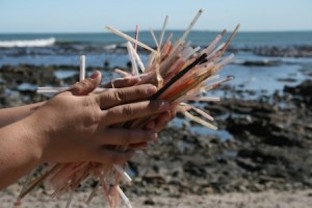 It may seem that there are much bigger issues affecting our waterways and oceans than an innocuous little straw. The threat of ocean acidification, overfishing, and rising sea levels worry us all, but it can often feel like there is nothing we can do to fight against the onslaught of climate change on marine ecosystems. At PCS, we focus on what we can do as individuals to lessen our impact on our precious water resources. One easy way to combat marine debris? Quit using drinking straws! Almost any restaurant or coffee shop will provide its customers with disposable cups, lids, sleeves, and a straw (usually wrapped in plastic or paper). That’s a lot of unnecessary waste for one drink! Very few people have a true need for a straw; it has just become part of our consumer culture. But this culture is consuming our aquatic friends by littering their homes and causing physical deformities.
It may seem that there are much bigger issues affecting our waterways and oceans than an innocuous little straw. The threat of ocean acidification, overfishing, and rising sea levels worry us all, but it can often feel like there is nothing we can do to fight against the onslaught of climate change on marine ecosystems. At PCS, we focus on what we can do as individuals to lessen our impact on our precious water resources. One easy way to combat marine debris? Quit using drinking straws! Almost any restaurant or coffee shop will provide its customers with disposable cups, lids, sleeves, and a straw (usually wrapped in plastic or paper). That’s a lot of unnecessary waste for one drink! Very few people have a true need for a straw; it has just become part of our consumer culture. But this culture is consuming our aquatic friends by littering their homes and causing physical deformities.
Straws break down into microplastics which have been found in almost 99% of studied marine life. And the problem seems to be getting worse. Each day, Americans go through 500 million straws! We have seen a steady increase of small plastics (including straws, plastic cutlery, and other food wrapping items) being found during our stream cleanups over the past ten years. This is not just a local issue; microplastics in our waterways has become a global topic of concern. We hope that with more awareness of this pollutant problem, legislation will follow that tackles the production side of the plastics problem.
So far, over 1800 restaurants, organizations, institutions, and schools have placed a ban on plastic straws or implemented a straw-upon-request policy. We use a straw only once, but they end up in our streams, rivers, and oceans for hundreds of years.
There are also reusable, stainless steel, or eco-friendly straws that you can purchase that won’t end up in our waterways (or a turtle’s nose! https://www.youtube.com/watch?v=4wH878t78bw). It’s these small choices that we make everyday that can have an enormous impact on our natural resources.
